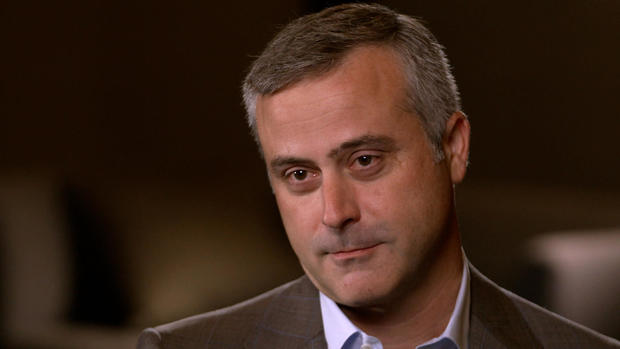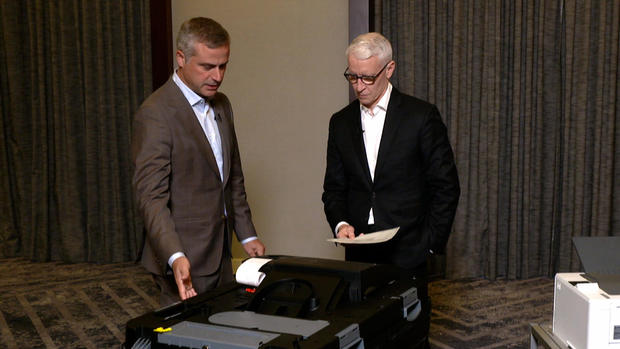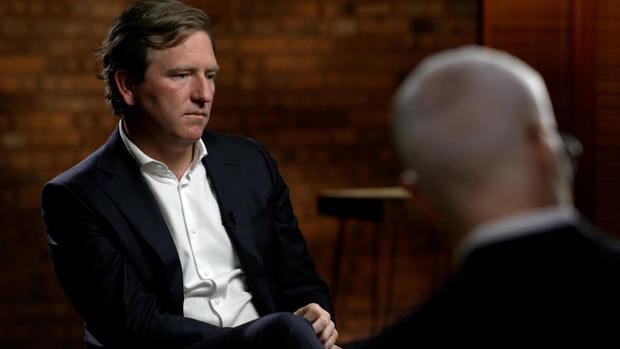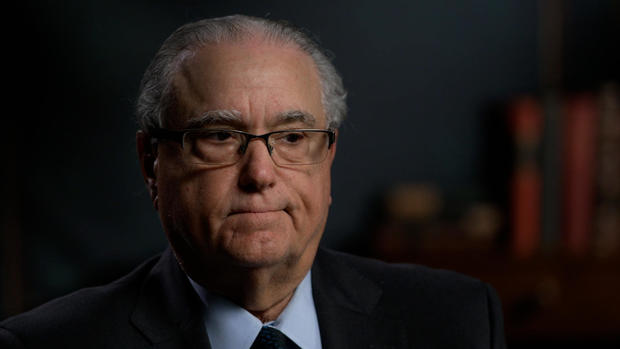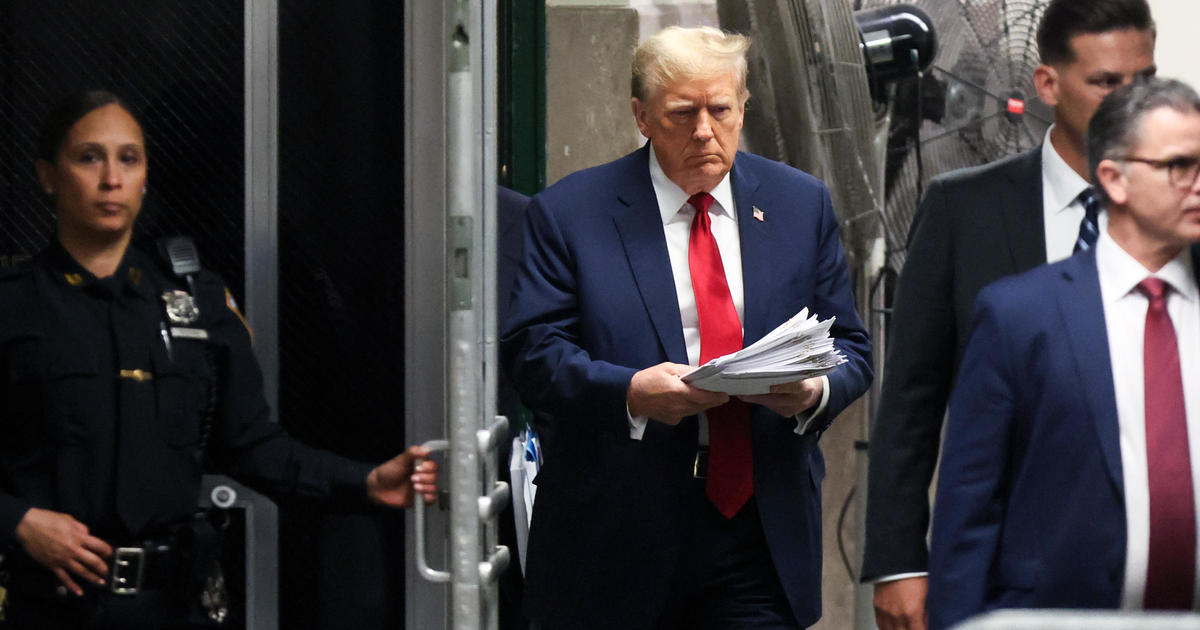Unraveling the unfounded conspiracies about Dominion Voting Systems
It was just days after the 2020 presidential election that lawyers supporting then-President Donald Trump began spreading unsubstantiated claims that an American company - Dominion Voting Systems - had rigged the election. They said Dominion was backed by Venezuela, and that its machines and software switched millions of votes from Donald Trump to Joe Biden.
They never showed any evidence, but that didn't stop pro-Trump attorneys from making baseless claims, or conservative news networks from giving them plenty of airtime. Dominion has filed eight lawsuits seeking more than $10 billion in damages against Fox News and other networks, corporations and individuals. But Dominion's CEO, John Poulos, has remained largely silent, until now. We spoke with him about the lawsuits, the lies, and the irreparable damage he says they've caused to his company and his employees.
John Poulos: People have been put into danger. Their families have been put into danger. Their lives have been upended and all because of lies. It was a very clear calculation that they knew they were lies. And they were repeating them and endorsing them.
Anderson Cooper: It's important to you people admit what they said was wrong?
John Poulos: It's important to me. It's important to all the people whose families have been impacted by this. Anderson, my kids still are not allowed to get any package from the front door-- until we verify that it's actually from-- from a trusted sender.
Anderson Cooper: You're that concerned about somebody sending something to your house?
John Poulos: It's not unfounded concern.
Anderson Cooper: People have done that--
John Poulos: People have done this. People are warning that they will continue to do this.
For John Poulos and his company, the trouble began five days after the election when Fox Business host Maria Bartiromo brought up Dominion with attorney Sidney Powell.
Maria Bartiromo: Sidney, we talked about the Dominion software. I know that there were voting irregularities. Tell me about that.
Sidney Powell: That's to put it mildly. The computer glitches could not and should not have happened at, at all. That is where the fraud took place, where they were flipping votes in the computer system or adding votes that did not exist.
Sidney Powell was never able to show fraud, but she was repeatedly invited back on Fox networks, as was the president's personal attorney, Rudy Giuliani, who also wove a false narrative about Smartmatic, an election technology company which is now suing Guiliani, Fox News, and others.
Rudy Giuliani: Smartmatic is a company that was formed by three Venezuelans who were very close to, very close to the dictator, Chavez, of Venezuela and it was formed in order to fix elections. That's the, that's the company that owns Dominion…
Anderson Cooper: Does Smartmatic own Dominion?
John Poulos: No. We are-- we do have a relationship. We-- (LAUGH) we are competitors.
Anderson Cooper: Were you associated with the late Hugo Chavez or--
John Poulos: Absolutely not.
Anderson Cooper: Do you use a Venezuelan company's software that's been used to steal elections in other countries?
John Poulos: Absolutely not.
John Poulos: Anderson, I can, I can cut all of this short. We were founded in Toronto -- which is where my family was from. And-- and-- there's nothing to do with Venezuela.
Anderson Cooper: Can you flip votes in the computer system? Can you add votes that did not exist?
John Poulos: (LAUGH) Absolutely not.
President Trump first mentioned Dominion in a tweet November 12th and recorded a video a few weeks later, which was posted on Facebook.
President Trump: We have a company that's very suspect. Its name is Dominion. With the turn of a dial or the change of a chip, you could press a button for Trump and the vote goes to Biden. What kind of a system is this? We have to go to paper. Maybe it takes longer. But the only secure system is paper.
Anderson Cooper: Why not just have paper ballots?
John Poulos: We do have paper ballots. What the machines do is they count those paper ballots-- in a way that makes it very easy for people to verify after the fact through the means of audits and recounts.
Dominion makes two types of machines. One is called a ballot marker. It's a touch screen device that a voter can use to mark their choices and then print the ballot. The second machine is a scanner that reads that paper ballot, counts the vote and immediately stores the ballot securely.
John Poulos: A voter takes a paper ballot. They've made their marks however they make their marks depending on the jurisdiction. As they deposit it into the ballot box, it goes through a digital scanner and then drops into the ballot box. So how do you hack a paper ballot?
He showed us how it works.
John Poulos: This is the scanner that sits atop a locked and sealed ballot box. This is how they cast their ballot, goes through scanner and now we have an image of the ballot that we just cast, and we have the paper ballot that is used for recounts.
John Poulos says it was watching the presidential recounts in Florida in 2000, with those arguments over hanging chads, that got him interested in improving how paper ballots were marked and counted. He was an engineer working at a startup in Silicon Valley and began looking at ways to make it easier to recount paper ballots and to help people with disabilities vote without assistance.
John Poulos: Our goal was to allow any voter to make their marks on a paper ballot in a very clear, unambiguous way, um, regardless of physical ability.
John Poulos is Canadian and founded Dominion in 2002. He remains its chief executive though, it was acquired by an American investment group in 2018. Dominion is based in Denver.
Anderson Cooper: Do you ever think to yourself, "I got into this to help paraplegics and blind people vote more easily and look what-- what's happened?"
John Poulos: Uh, I think about it all the time.
Dominion is one of three companies that make most of the voting systems in America. In the 2020 presidential election their machines were in 28 states - red states and blue.
Anderson Cooper: On election day, in a precinct, are your machines hooked up to the internet?
John Poulos: No. Not by-- not by any stretch. We go through a number of-- f-- certifications, government certifications. And-- and the first one is at a federal level. So those standards mandate that election systems, such as ours, are designed to work in a closed system, air-gapped, no internet.
Anderson Cooper: In all the major swing states of 2020, there are paper ballots backing up—
John Poulos: Not only are there paper ballots, um, that make up the official record, those paper ballots have been hand-counted and audited over 1,000 times on just the 2020 election.
Recounts and audits in the swing states of Georgia, Arizona, Michigan, Pennsylvania and Nevada all confirmed Dominion's results. More than 60 lawsuits around the country challenging the election by Trump or his supporters were ultimately withdrawn or failed.
Anderson Cooper: In Georgia, there have been three recounts. Two electronic ones and one hand recount.
John Poulos: In front of cameras, bipartisan poll-- poll watchers, and thousands of local residents across the state of Georgia. And it once again, reaffirmed the results. That should've put an end to all of it. Um, but it-- the lies persisted.
And so have incidents of harassment and threats against John Poulos and his employees.
Phone call from woman to Dominion: Every single person at Dominion's going to end up in an orange jumpsuit in handcuffs, you f***ing whores. You cheating f***ing pigs.
Phone call from man to Dominion: Yeah, good afternoon, scumbags. We're going to blow your f***ing building up. Piece of f ***ing s***.
John Poulos: I don't wish to sit here and, and say that this is something that happened 18 months ago. This is something that continues to happen every single day for us. Last Friday we had an office on lockdown. Two days prior to that, I was on a phone call with one of our employees who's a mother of two. Um, very upset and crying-- it's hard to talk about.
Anderson Cooper: Had something been said to her personally?
John Poulos: A very disgusting death threat in detail.
Anderson Cooper: Received…
John Poulos: …on her personal cellphone.
Chris Krebs: It's completely and utterly surreal. None of these lies have been substantiated to any extent. They-- they-- every single one of them has been debunked.
Chris Krebs was director of the cybersecurity and infrastructure security agency charged with protecting the 2020 election. He called it the most secure election in American history and, days later, was fired by President Trump. He now has a cyber consulting firm and is a contributor for CBS News.
We showed him a press conference held two days after his firing at the headquarters of the Republican National Committee, when Rudy Guiliani, Sidney Powell and others continued their attacks on Dominion machines and software.
Sidney Powell: It can set and run an algorithm that probably ran all over the country to take a certain percentage of votes from President Trump and flip them to President Biden.
Anderson Cooper: Do you remember watching that?
Chris Krebs: Yeah. I tweeted about it immediately afterwards. I think I said something along the lines of, "That was the most insane and dangerous 45 minutes of TV in, you know, American history," effectively.
Anderson Cooper: How secure was the 2020 election?
Chris Krebs: Let me put it this way. It was the most litigated. It was the most scrutinized. It was the most audited. This election was put through the wringer from so many different directions. And what-- what I tend to like to say is, you know, "Don't listen to me. Listen to Bill Barr. Bill Barr said it. He was then the attorney general of the United States."
This is what Bill Barr later said to the january 6 committee.
Bill Barr: These claims on the Dominion voting machines and they were idiotic claims. I saw absolutely zero basis for the allegations, but they were made in such a sensational way that they obviously were influencing a lot of people.
Dominion began alerting Fox News and other networks of the false allegations they were broadcasting November 12, four days after Sidney Powell first discussed Dominion with Maria Bartiromo. But Dominion says Fox News never retracted their reporting.
Anderson Cooper: You gave them a lotta chances to correct their statements.
John Poulos: They still haven't corrected them.
Lee Levine: To me, that's the most powerful part of the complaint.
Lee Levine is a First Amendment attorney who's litigated cases for 40 years on behalf of most media companies, including CBS and FOX. He's retired now, but his old firm is currently representing CNN and me in a separate matter, filed by attorneys who also represent Dominion in its cases against Fox News and others.
Lee Levine: Take the Fox case for example. November 12th seems to me to be the key date in that case, because that's the day that Dominion started, on a regular basis, sending
information sheets to every producer on every show at Fox that was having Sidney Powell and Rudy Giuliani on, saying, "Here are the true facts. Here are links supporting our assertions that these are the true facts." And then these people continued to invite Giuliani and Powell on their shows.
Anderson Cooper: Defamation cases are hard to prove, aren't they?
Lee Levine: Yes, they are. The plaintiff has to prove what the law calls actual malice. You need to show basically that the defendant published or broadcast a deliberate lie, a calculated falsehood.
Anderson Cooper: They knew it was a lie when they broadcast it?
Lee Levine: They knew it was a lie or they knew it was probably a lie.
Anderson Cooper: How strong is Dominion's case against Fox and the others?
Lee Levine: I think it is much stronger than most defamation cases that I have seen. I might say it is the strongest.
Anderson Cooper: How many defamation cases have you seen?
Lee Levine: I have litigated myself hundreds. And I'm certainly aware of every significant defamation case in the last forty years.
Anderson Cooper: And this is the strongest one?
Lee Levine: In my judgment.
In a statement to 60 Minutes, Fox said it's confident it will prevail, citing freedom of the press protections and stating it was reporting on a newsworthy allegation made by the "[then]" president and aired segments fact-checking the allegations against Dominion. Dominion is suing Fox News and its parent corporation for $1.6 billion each and, in its statement, Fox said that Dominion's financial demand is unsupported. Efforts by Fox News and other defendants to have the lawsuits dismissed have been rejected by the courts.
Anderson Cooper: Do you think that you can show not only that they lied, but they knew that they were lying?
John Poulos: I-- I don't even think-- I think that's the easiest part.
Anderson Cooper: You, as a company, told them specifically, repeatedly.
John Poulos: We told them. We told them in real time. Others told them. Government officials told them. Partisan government officials told 'em. People inside-- the Trump administration told them. Um, local election officials on both sides of the aisle told 'em. This is not a matter of not knowing the truth. They knew the truth.
Produced by Sarah Koch. Associate producer, Chrissy Jones. Broadcast associates, Eliza Costas and Annabelle Hanflig. Edited by Sean Kelly.
